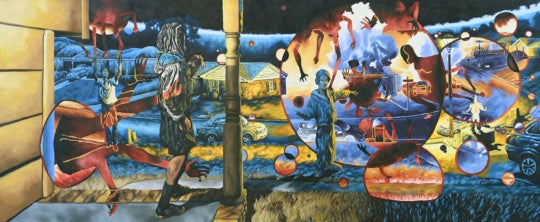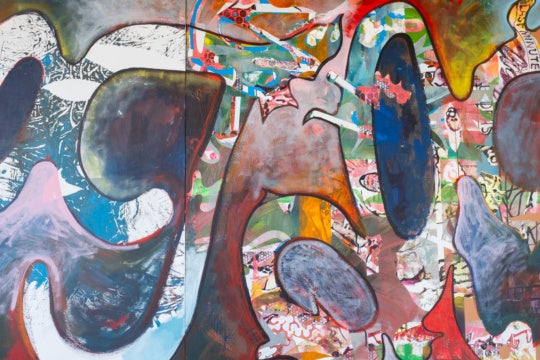[cont.]
Feral animals are always wary, aren’t they? They scoot away when approached, attack when cornered. In humans, that wariness is cloaked in anger. Maggie had sliced her anger open and stuffed it with knowledge. That was her way of mitigating it. Barbara reveled in her anger, honed it into an art form, wrapping her whole being around it.
Odessa’s sweet momma was seldom blunt, so when she insisted in no uncertain terms that anger in women is not an attractive trait, Odessa listened. She and her momma were having one of their heart to hearts while they chopped and basted during Thanksgiving break Odessa’s freshman year in college. What should she do about her roommate who was always on the lookout for insults? If Odessa said she liked a dress, then the roommate presumed she didn’t like the other dresses. If Odessa offered to treat her to lunch, the roommate would rage that Odessa was condescending to her, implying she was too poor to buy her own lunch. If Odessa stayed silent, she sniped that Odessa was too good to talk to her. It was an impossible situation. Her momma suggested asking questions and listening. But when Odessa tried this approach, the roommate screamed that the questions were none of Odessa’s business and shouted profanities which everyone on that floor of the dorm heard quite clearly. After Odessa moved out at the end of the term, she discovered a slender beaded bracelet missing. The roommate wore it to classes, taunting Odessa to make a fuss about it. Odessa let the loss go. She’d done the same thing with Paula and her wonderful paintings. She just let the loss go. Some battles are not worth fighting. Most people feel that way actually. They walk away. Anger isolates. It forces everyone to flee its infection. And the greater the isolation, the more intense the anger grows. It’s a tight downward spiral into perpetual rage.
Over the course of their conversation at the bistro, Odessa understood how accurate Maggie had been about Barbara. You really could see that she was a wonderful person under the gruffness. It was a real shame the two of them couldn’t work it out. As Barbara talked about an idea for her next film about the odd resurgence in yodeling, you couldn’t escape her enthusiasm for her medium, her wonderfully nasty sarcasm about the hipsters with their beards and leggings yodeling along the streets in Bushwick. The more Odessa smiled and nodded, the more animated Barbara became. It was cute and sad simultaneously, this great need for a positive, attentive audience. This was the same technique she had used with Maggie to give her the space to open up, the way Odessa’s momma had taught her, to listen and smile.
But even though they came to meet every couple of weeks for drinks and conversation, Odessa listened vastly more than she talked. As much as she enjoyed their get-togethers, she didn’t share or mock herself as she had with Maggie. You don’t put bullets in a gun unless you want something shot.
Forty Eight
“Magpie, thanks for sharing your preliminary write-up about memory. You’re right. Once you think about it, memory really does function like pancake makeup, making us all have a completely perfect complexion as long as the cameras can’t zoom in too tight. Memory’s Make Up would actually be a great title for a series – used canvases painted over in a single mat flesh tone, pristine from a distance, craggy up close. Too bad the paintings have already been done. Several times. Over several decades. But back to your write-up – what your comments boil down to is 1) memory/history demonstrates that we are unreliable narrators which we’ve all known since Henry James; 2) memory/history is one sliver from a complex reality, no one story ever capable of explaining the whole. Yes, both are true. On a grand cultural level and on a personal level. Facts can be twisted. We need them to twist to sustain our story. It’s how we survive. Our narrative requires that we see ourselves as heroes or as victims or both. Most of us do try to make ourselves heroes in our own story to give meaning to our lives. And if that requires fudging the facts, can’t fault anyone for that, can you? Truth is ultimately less important than a compelling story, a memorable image. A good distortion can reveal a greater truth. That’s the bottom line of art – to tidy up all the conflicting half truths into a neat, easily digested bundle which alludes to more. Not original thinking, I know. Just throwing a bunch of crap out there to see if anything sticks. Send me the essay when you’re done if you want.
I’m attaching something I wrote about my childhood. You can reciprocate or not.
Chaste hugs and misdemeanors, Alex.




